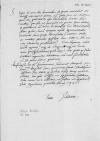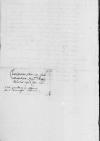List #605
Alfonso de VALDÉS do Ioannes DANTISCUSGhent (Gandavum), 1531-03-30
Regest polski: Valdes doradza Dantyszkowi w sprawie sposobu uzgodnienia ceny. Zawiadamia, że cesarz spędzi Wielkanoc w klasztorze [Augustianów] w Groenendaal niedaleko Brukseli, po czym powróci do Gandawy. Nie zajmowali się jeszcze sprawą Scypiona. Nie ma wiadomości z Węgier ani o Turkach, prócz tego, że z Italii piszą, że flota [turecka] jest mniej przerażająca, niż głosiły plotki. Valdes przesyła Dantyszkowi kopię fragmentu listu, który otrzymał od namiestnika skarbu [Pompeo Colonna]. Pisze on, że Neapol jest zależny od królowej [Bony], dopóki nie zostanie załatwiona sprawa Monte Serico. To samo pisze także Sigismundo Loffredo. Valdes zachęca Dantyszka do podjęcia działań w tej sprawie.
| odebrano Antwerp, [1531]-03-31 Rękopiśmienne podstawy źródłowe:
Pomocnicze podstawy źródłowe:
Publikacje:
| ||||||||||||||||
Tekst + aparat krytyczny + komentarz Zwykły tekst Tekst + komentarz Tekst + aparat krytyczny
Clarissimo viro, domino
Salutem.
Sapis, si cum his hominibus de pretio convenire vis, antequam eorum domos intres, nam quod iure eis debetur — parum est, quod tua tu ipsis liberalitate donare soles — multum. Quo fit, ut quicquid eis praeter spem dederis, id putabunt esse lucri et beneficii loco adnumerabunt.
Rescripsit ad me
Vale.
Tuus


 UUB, H. 154, f. 48v
UUB, H. 154, f. 48v